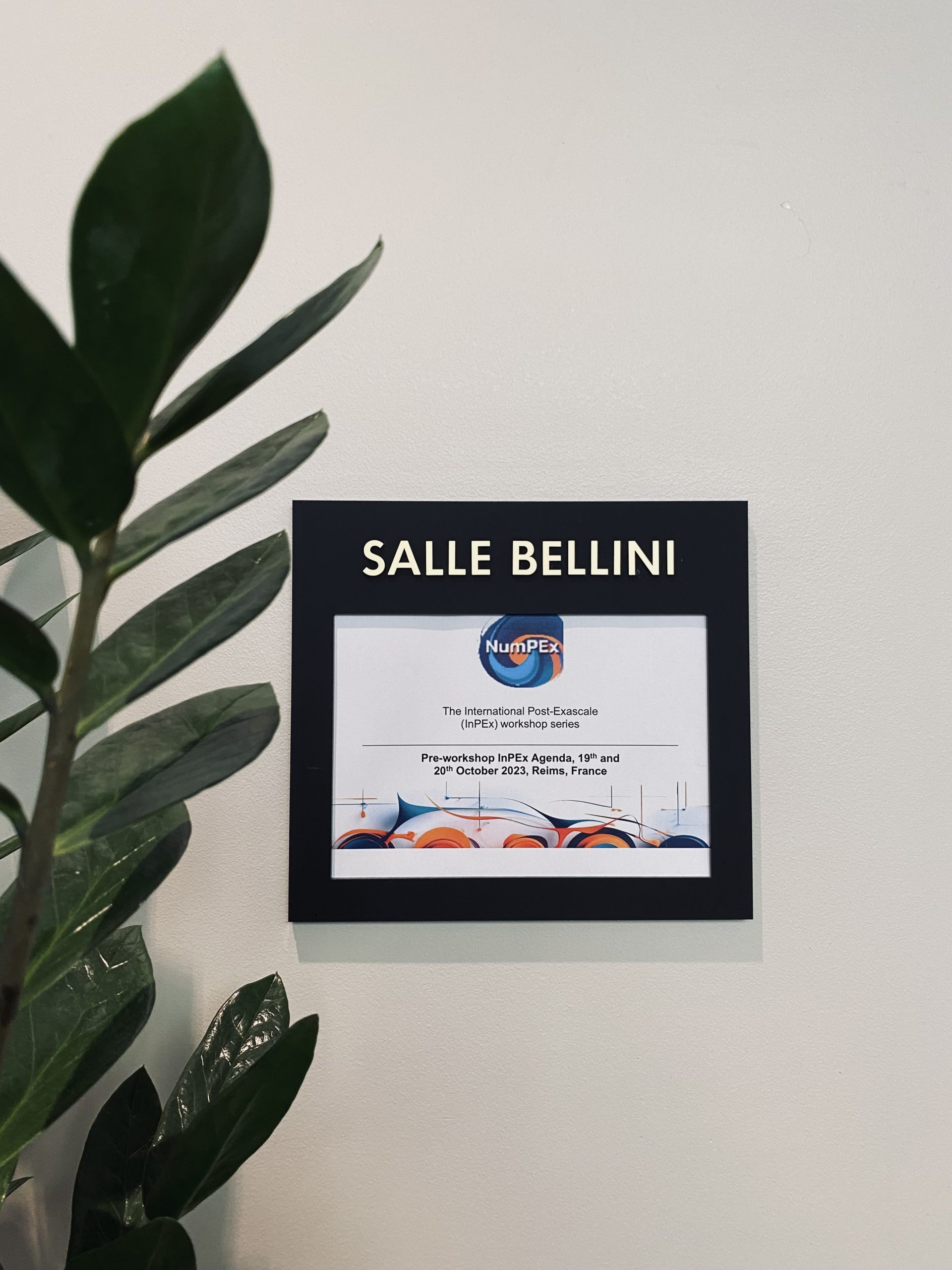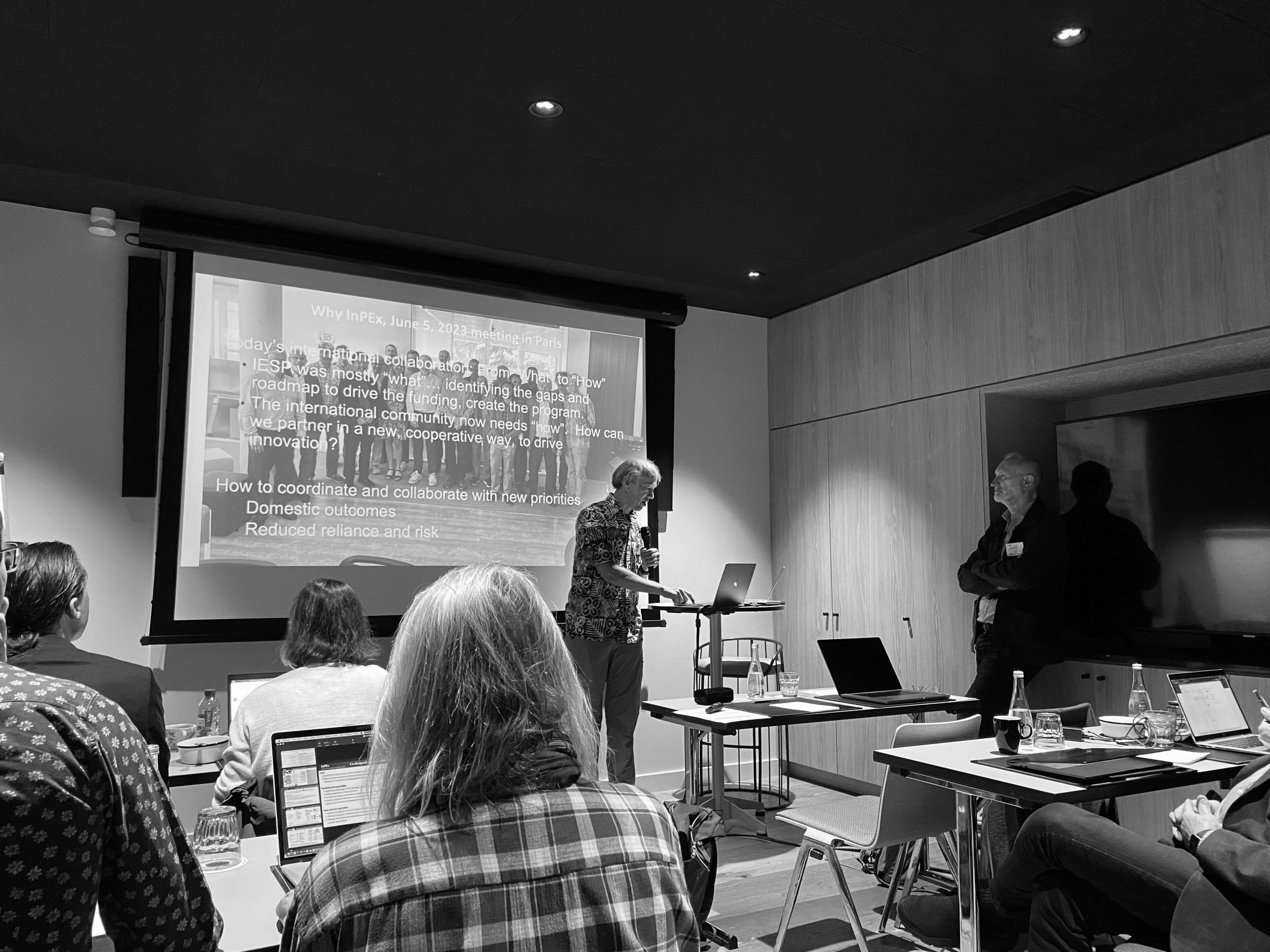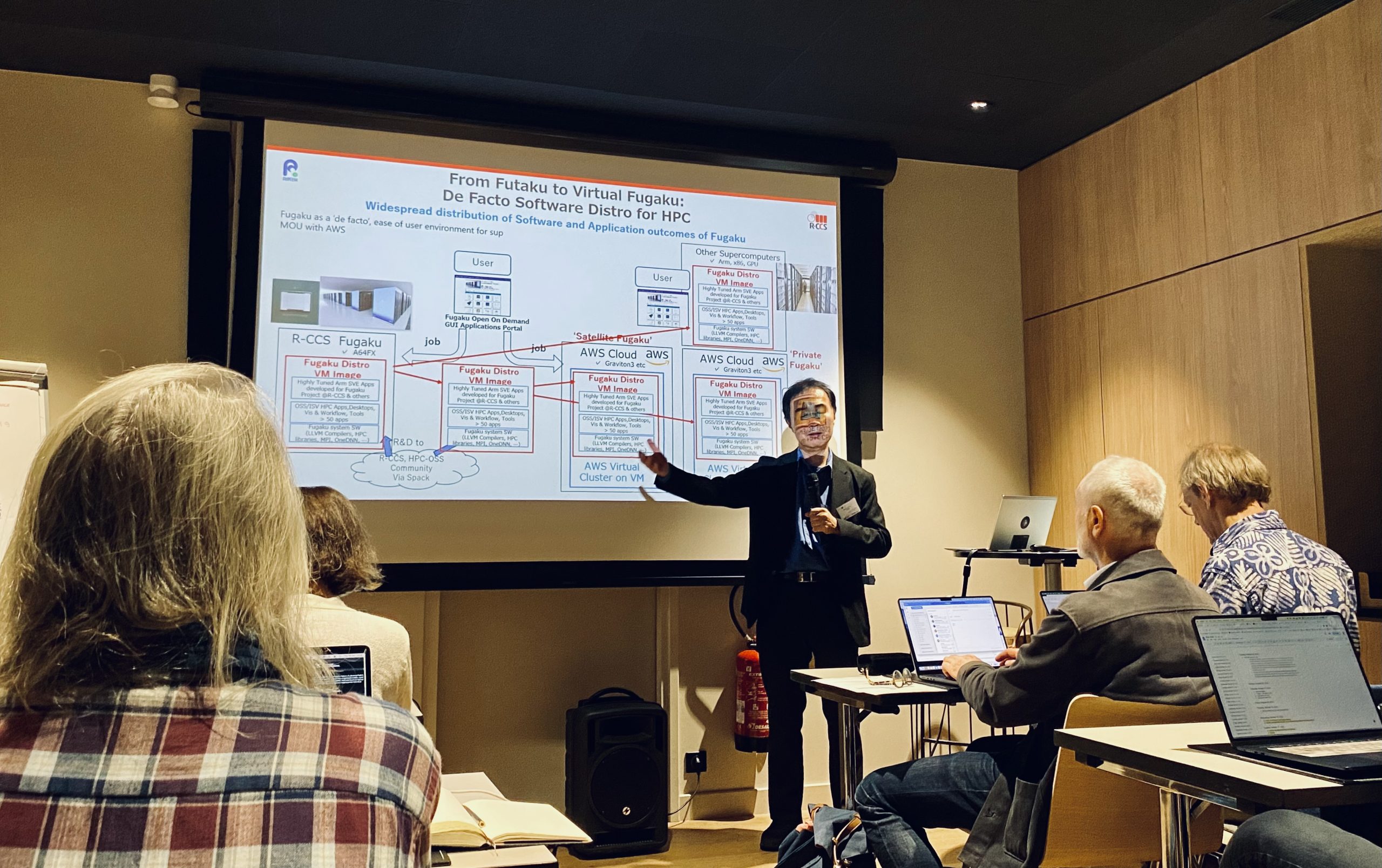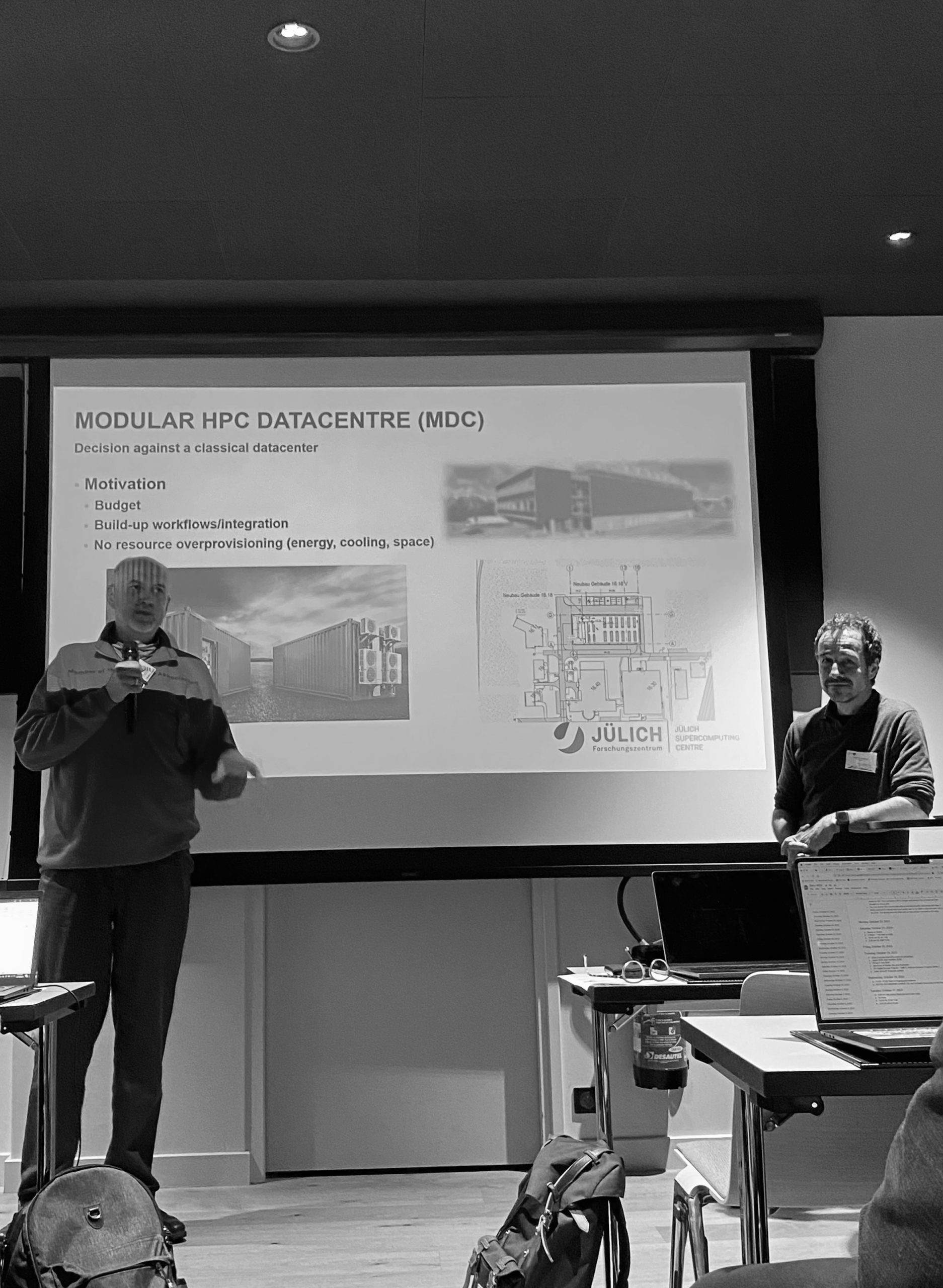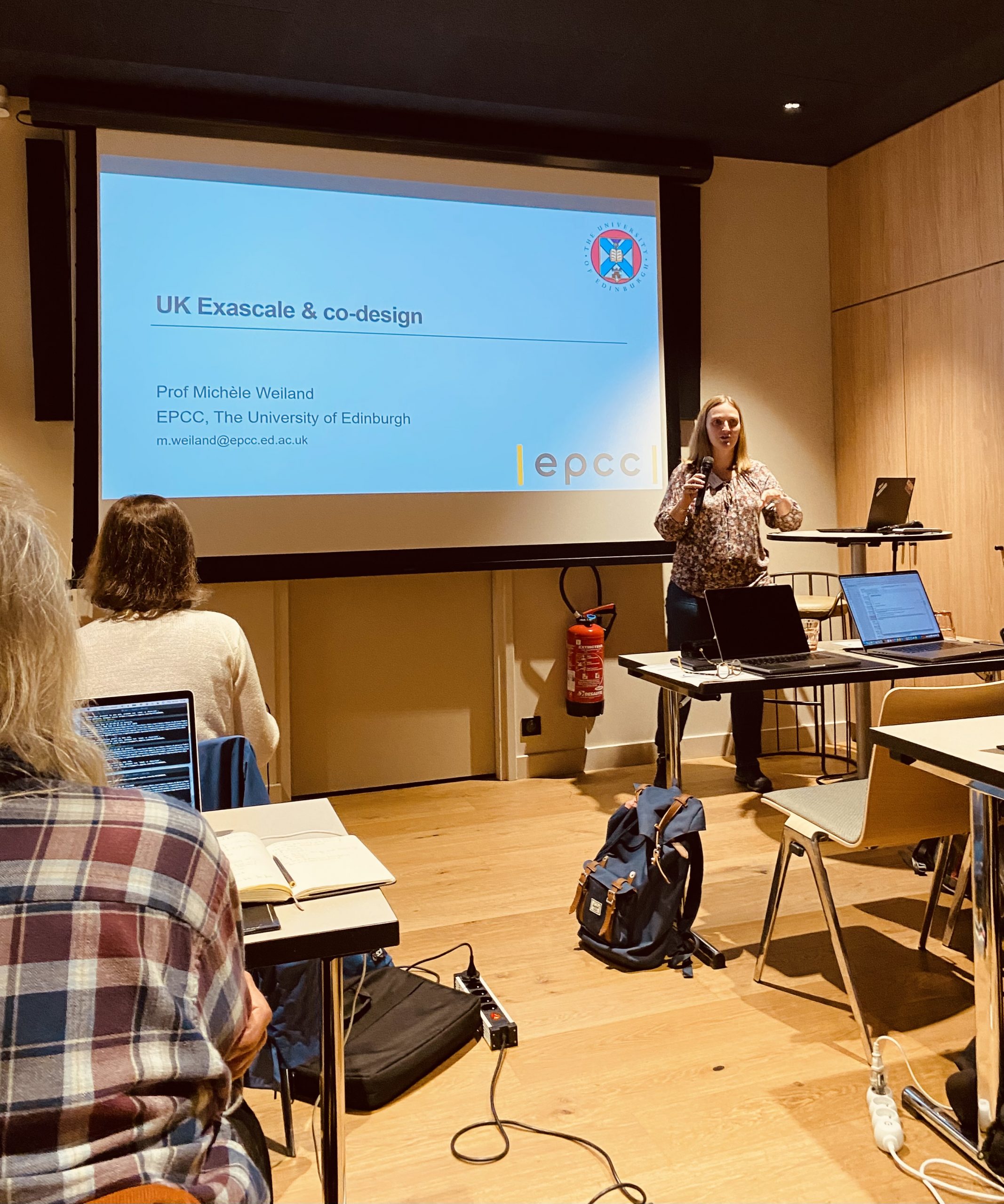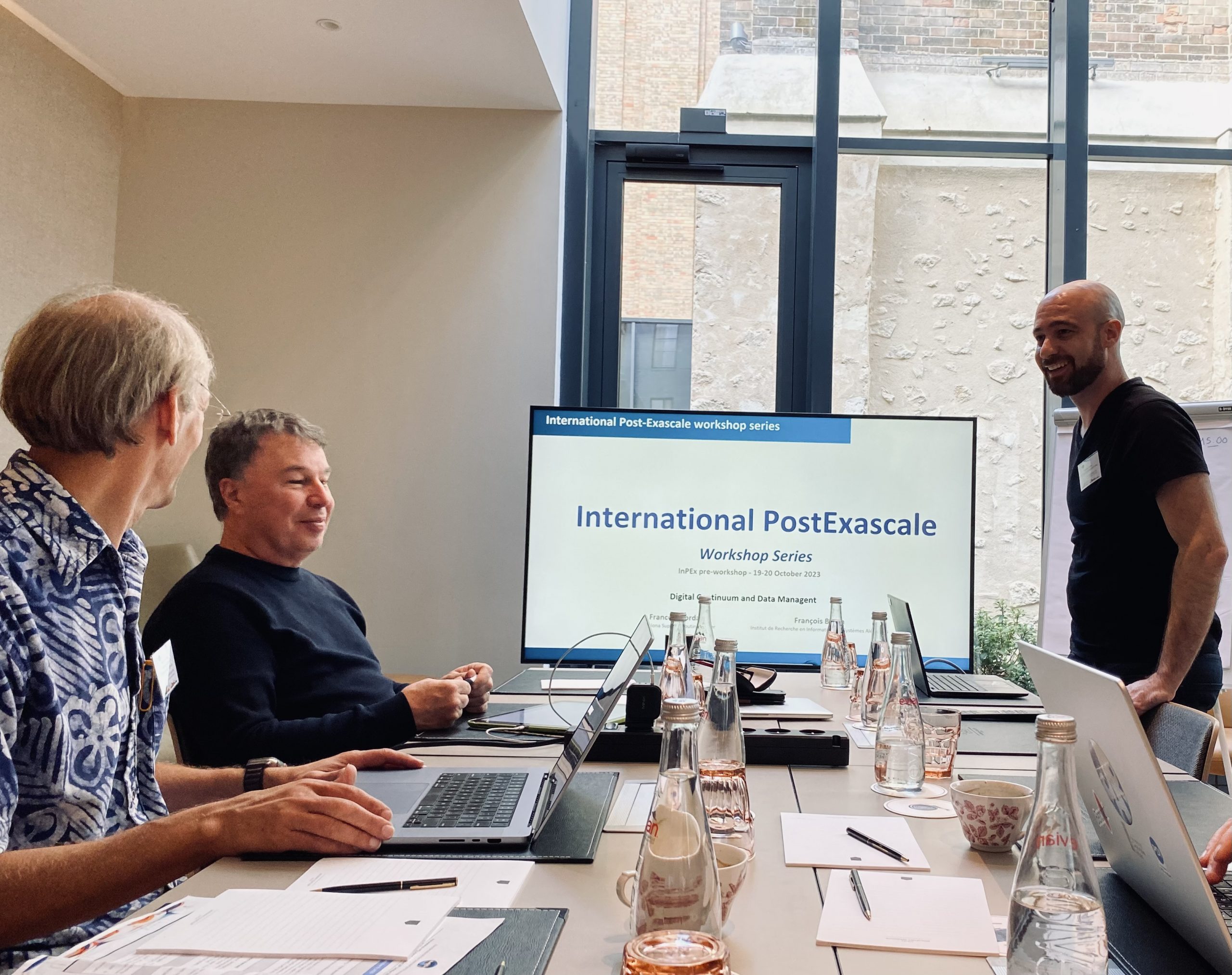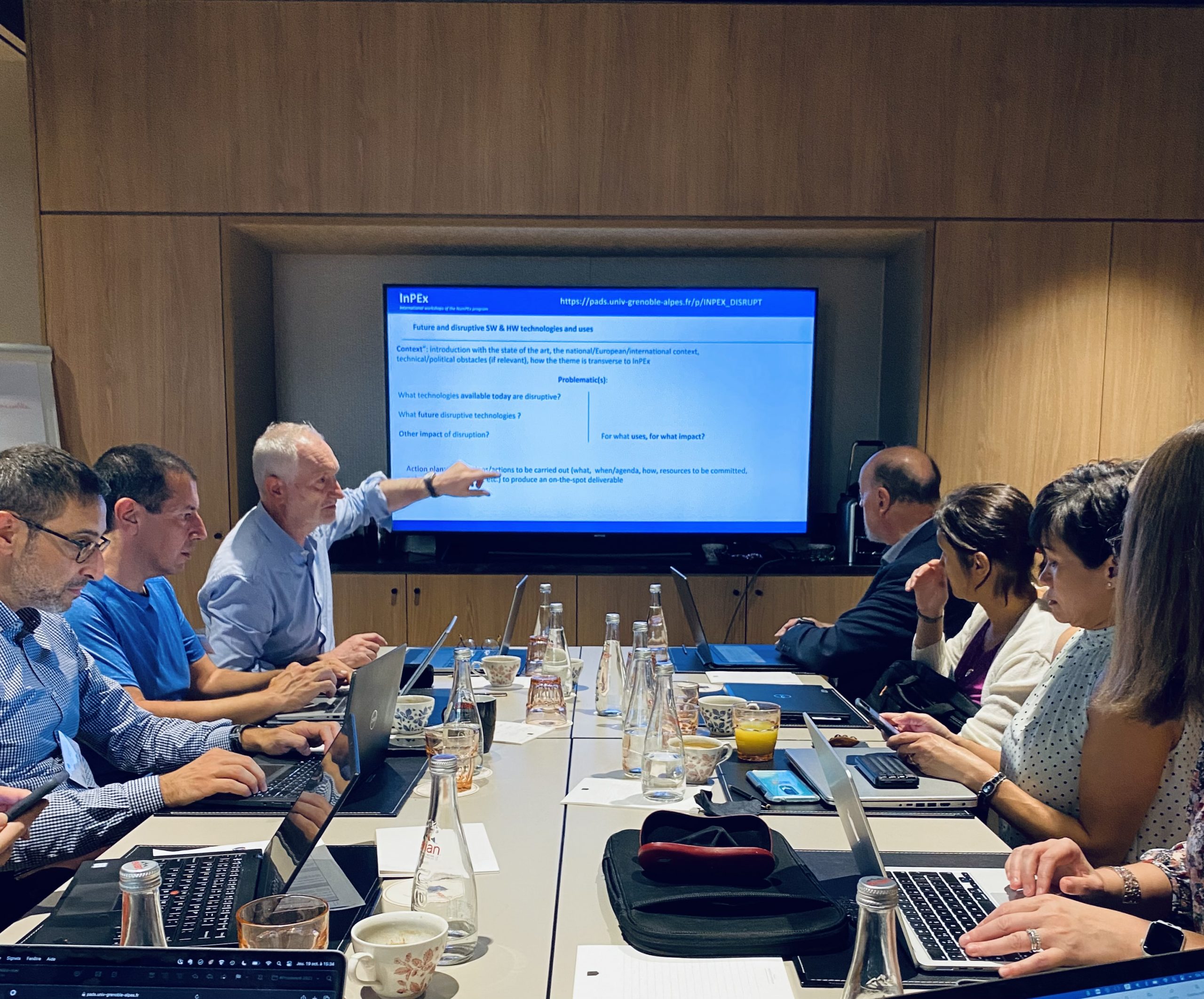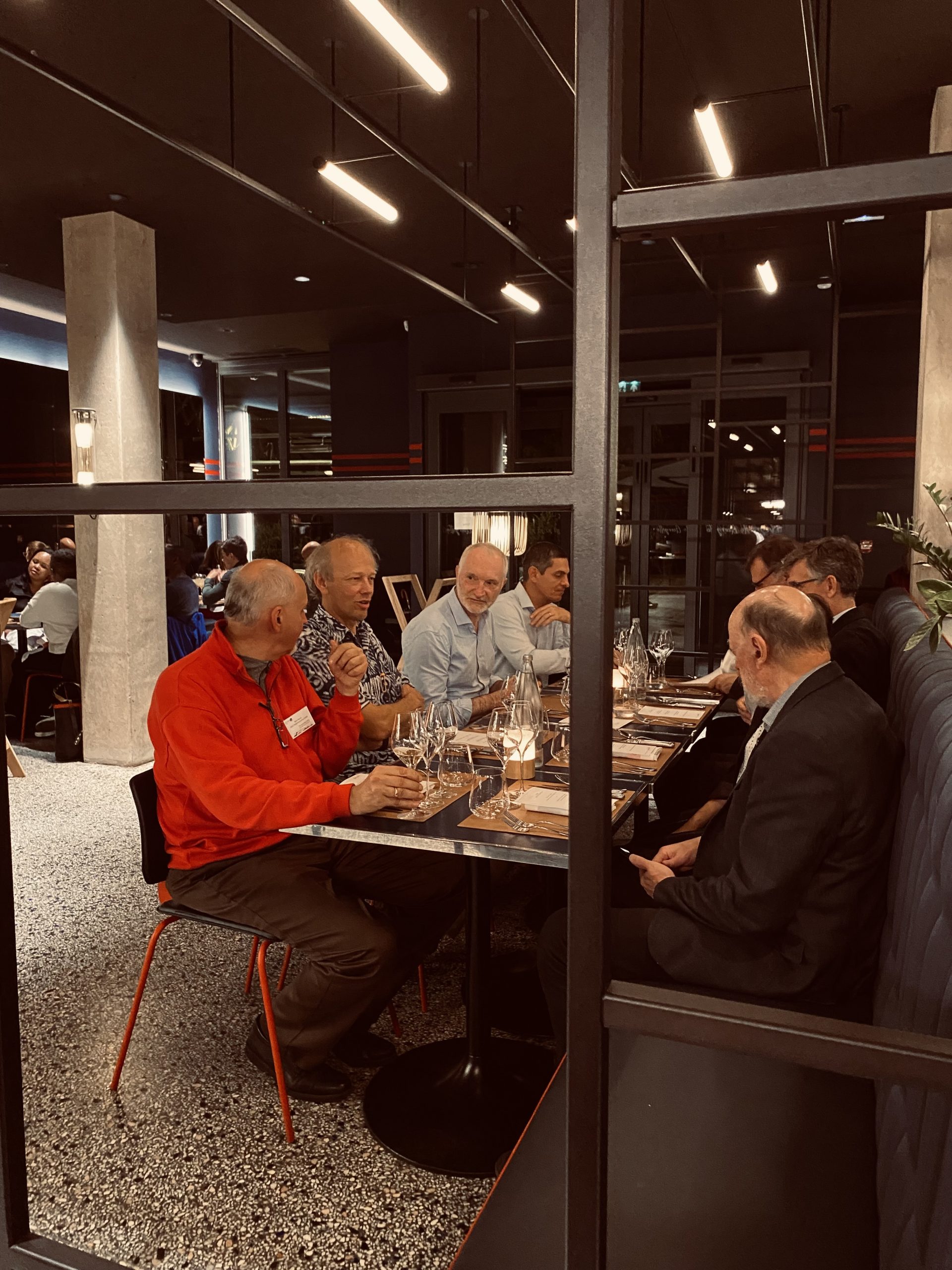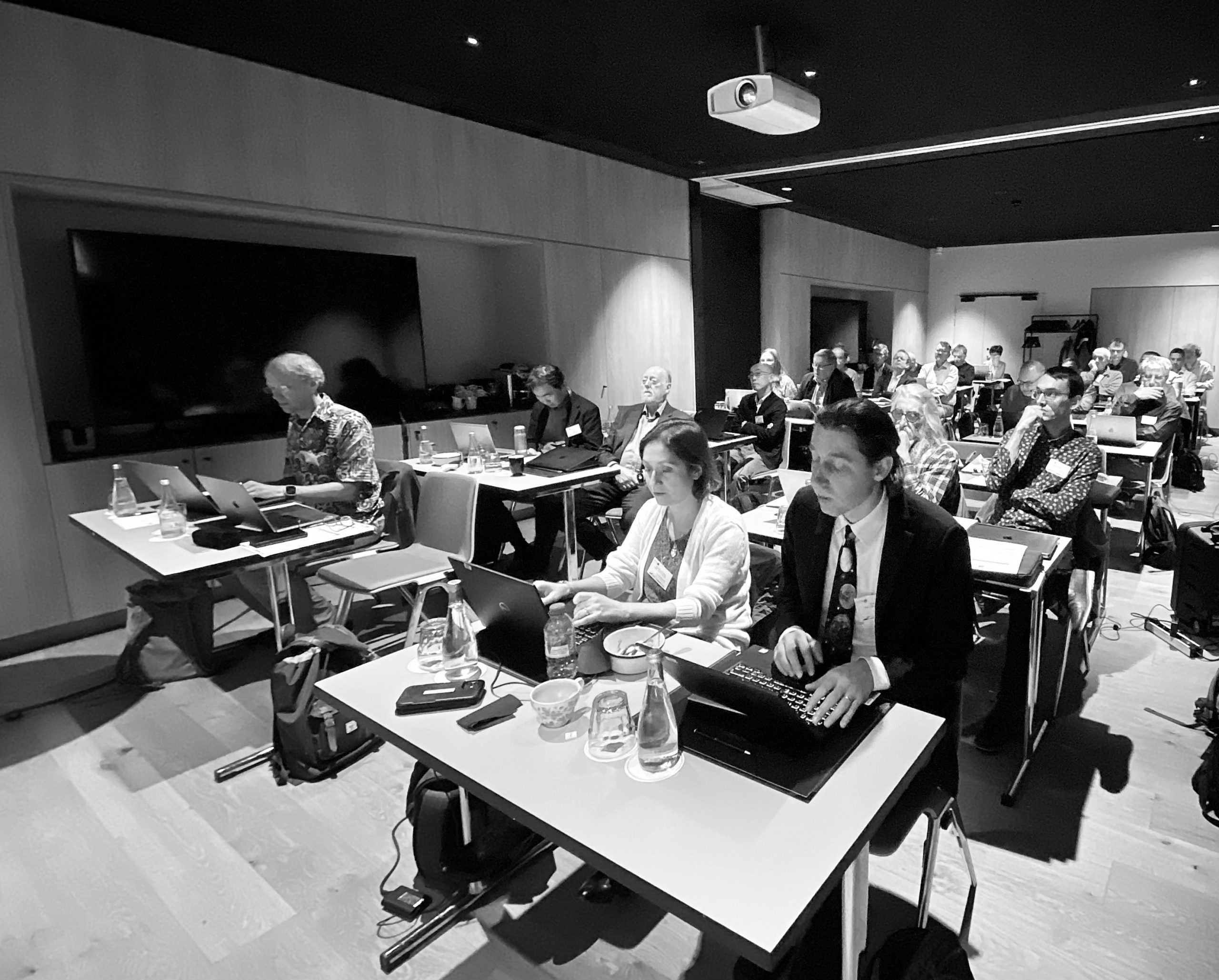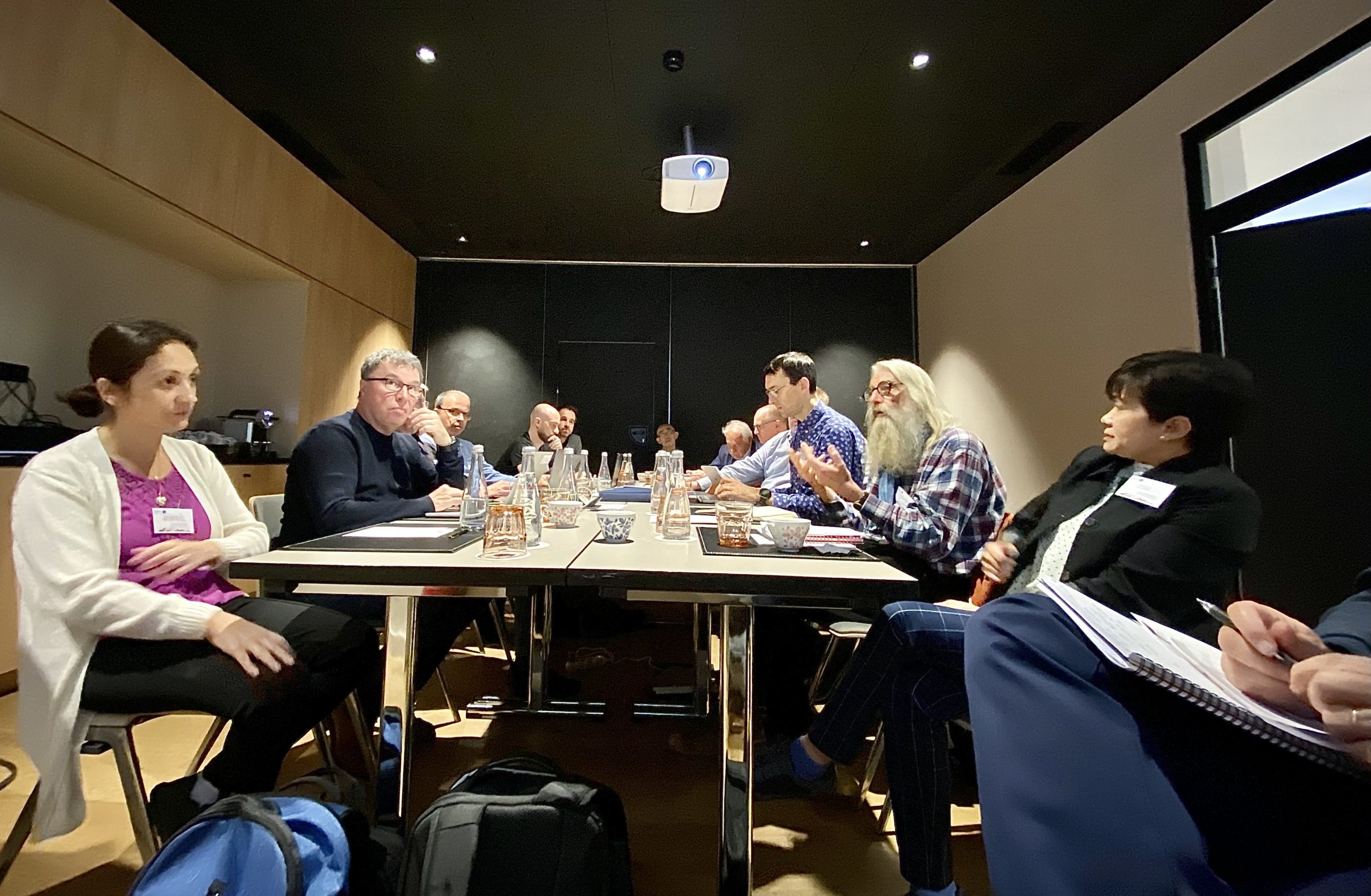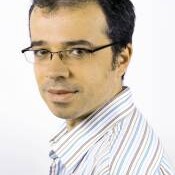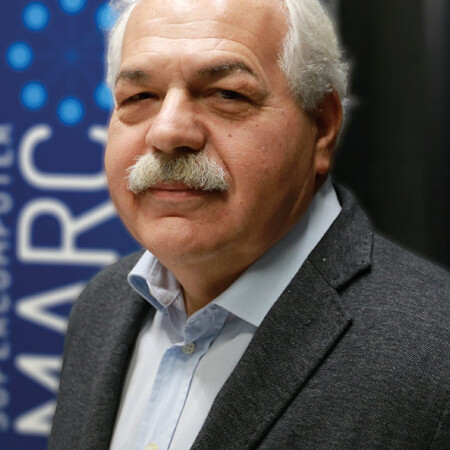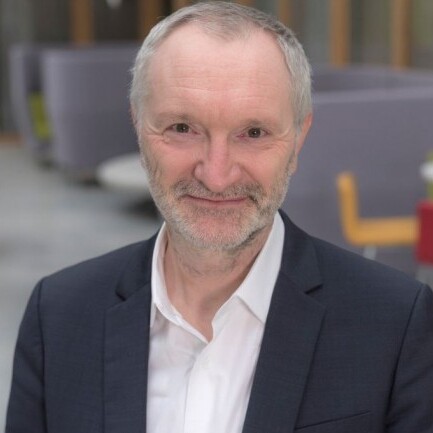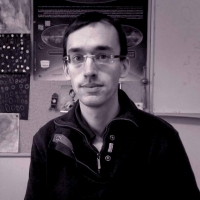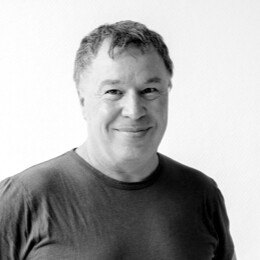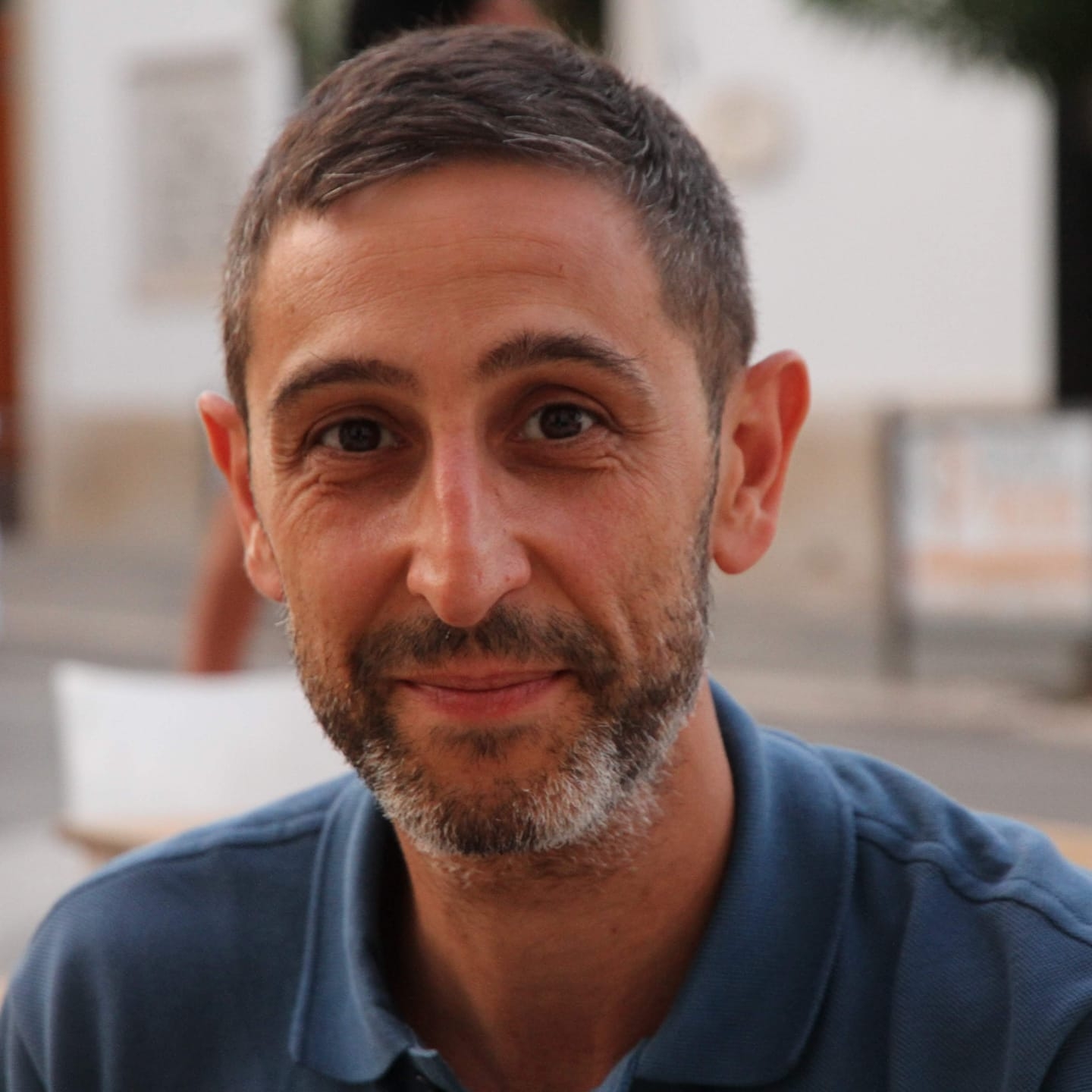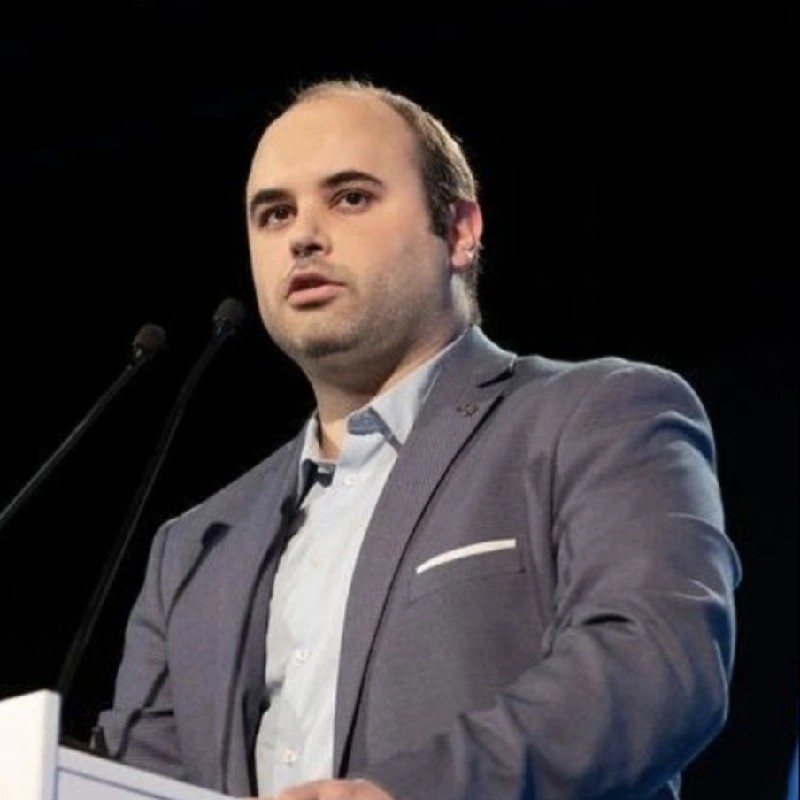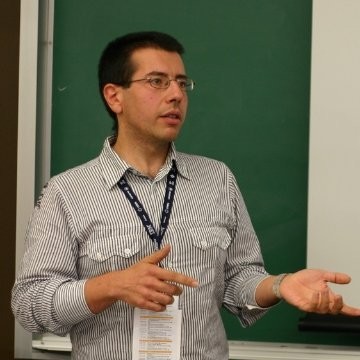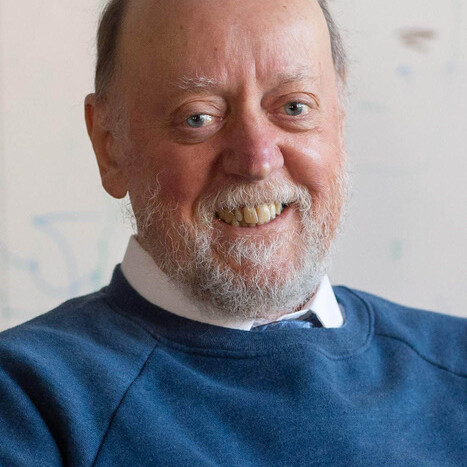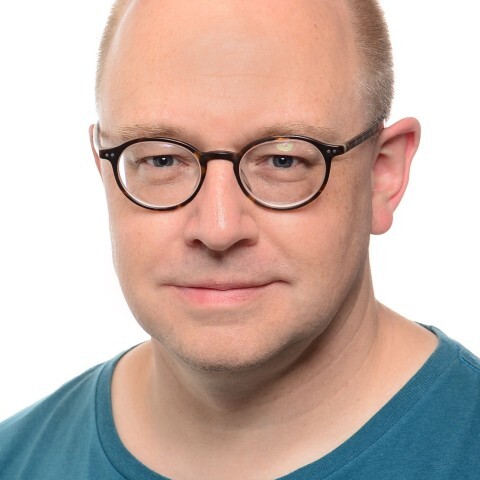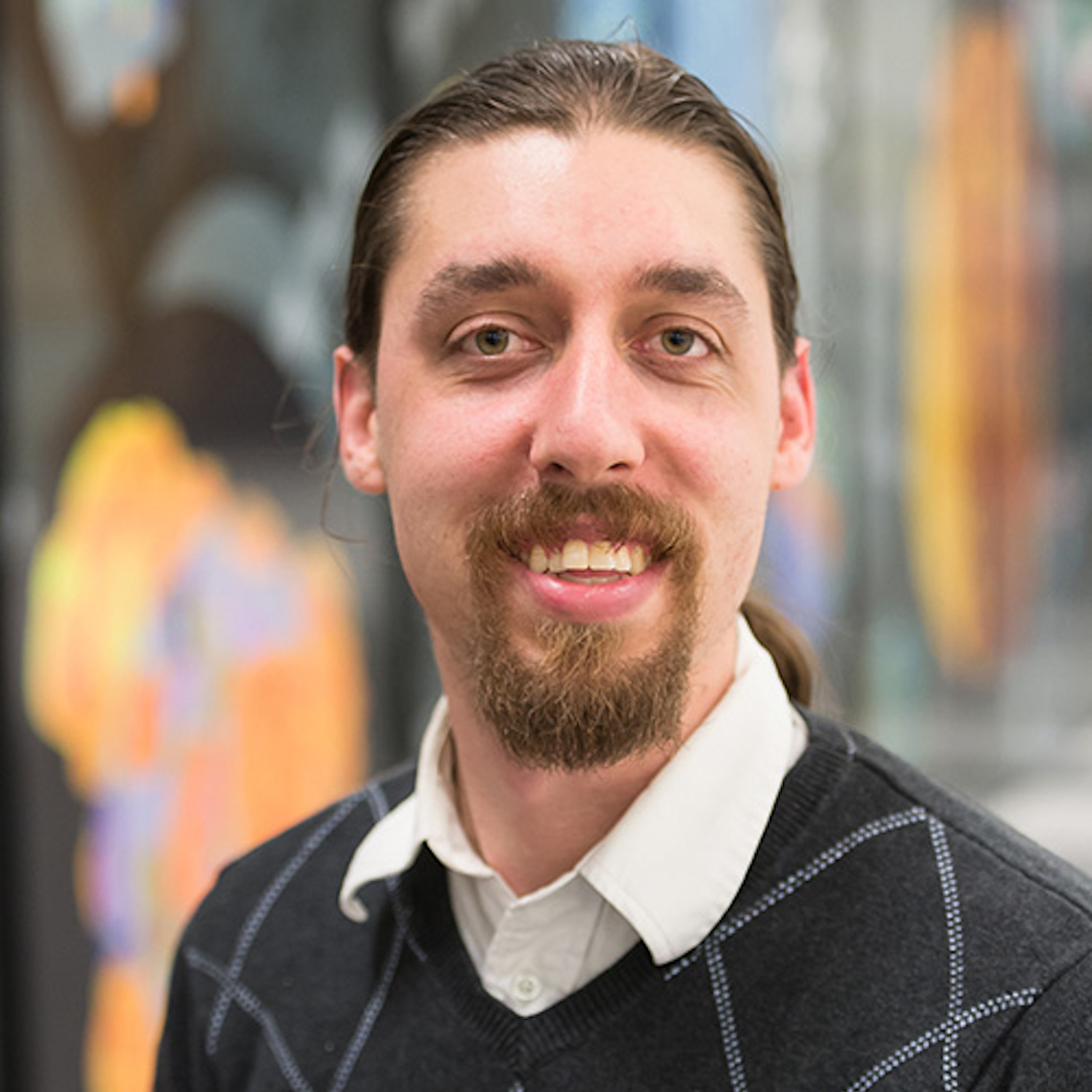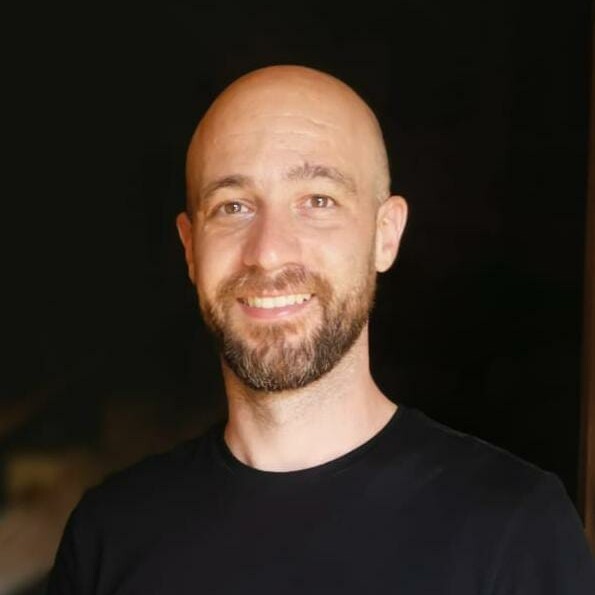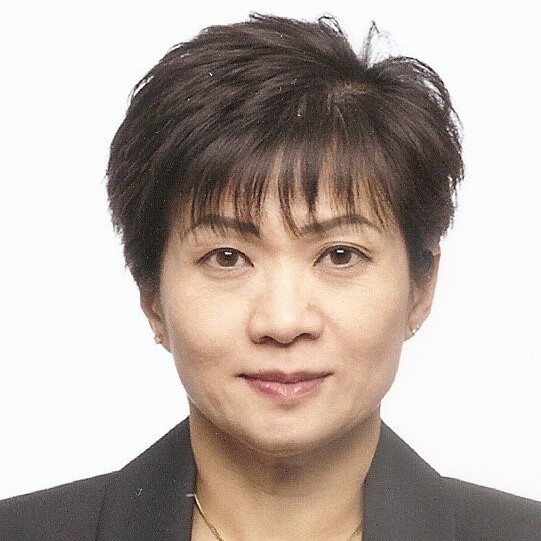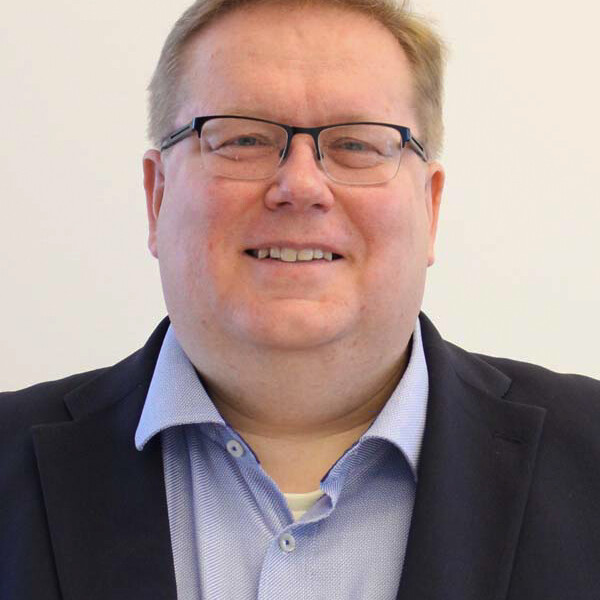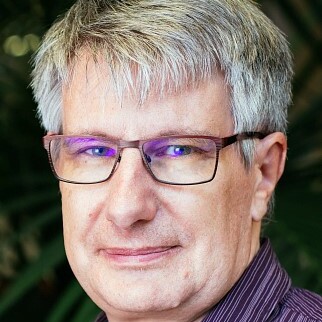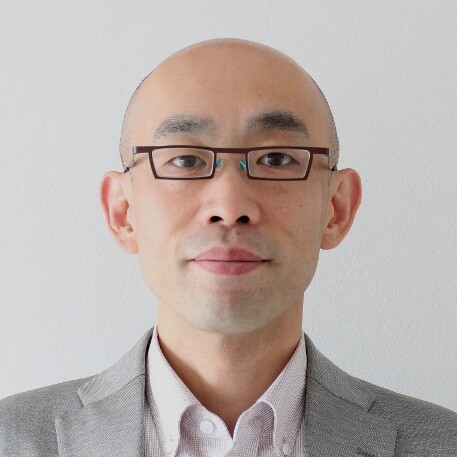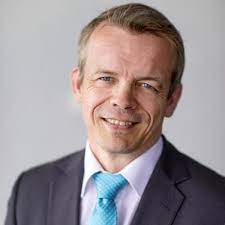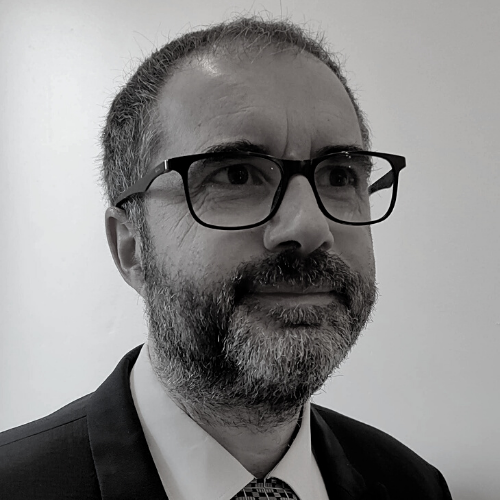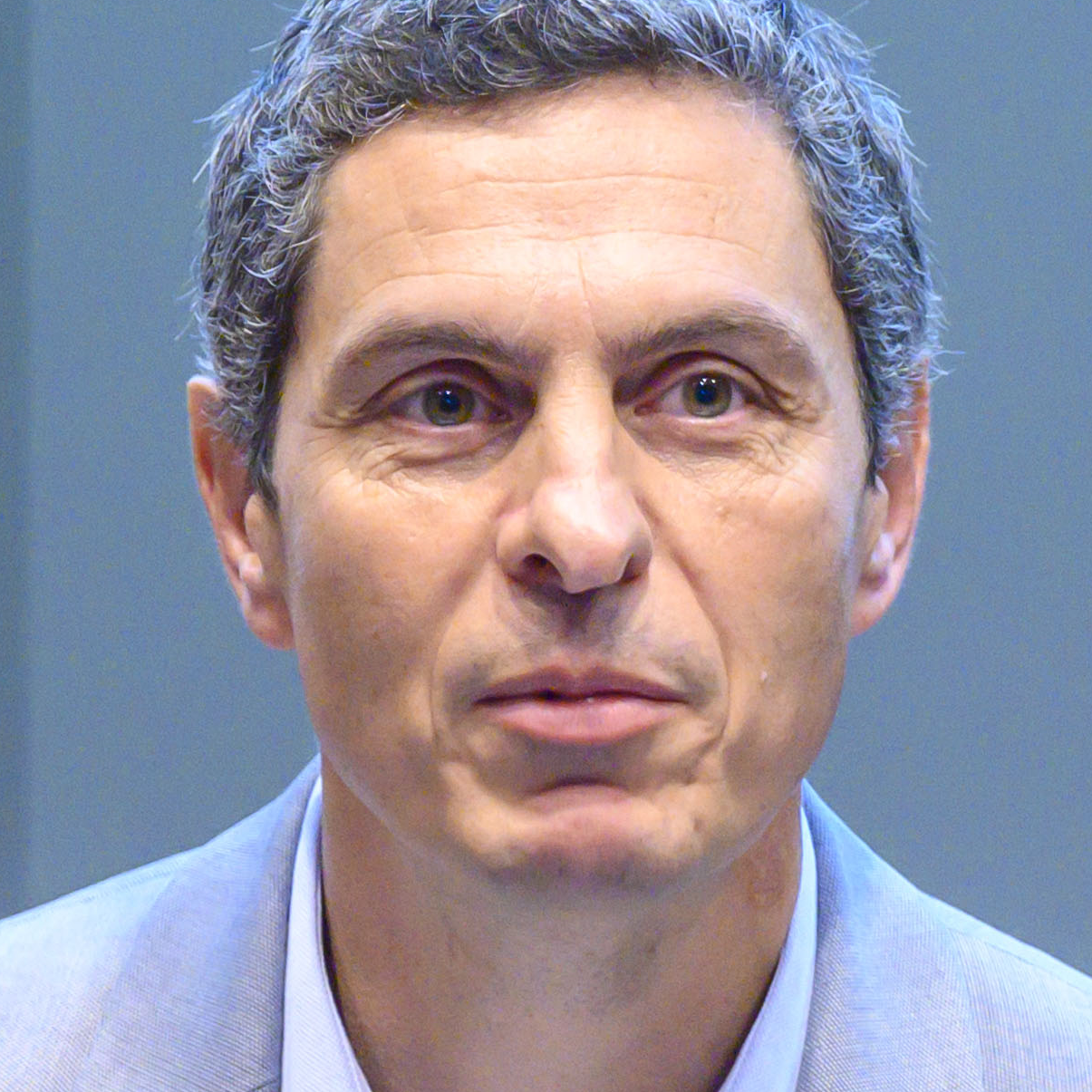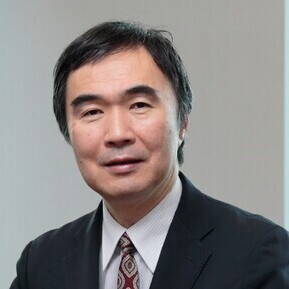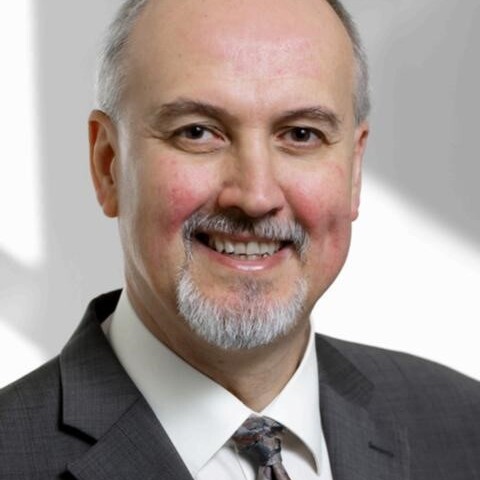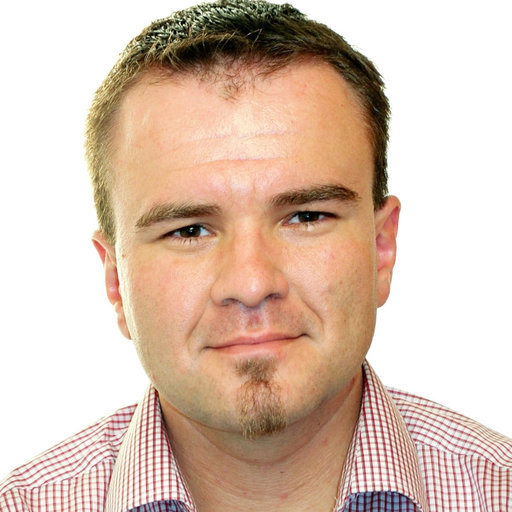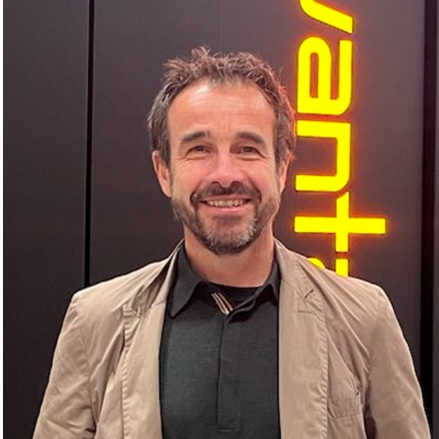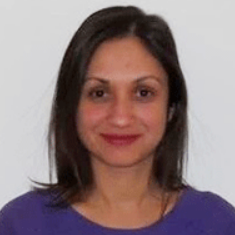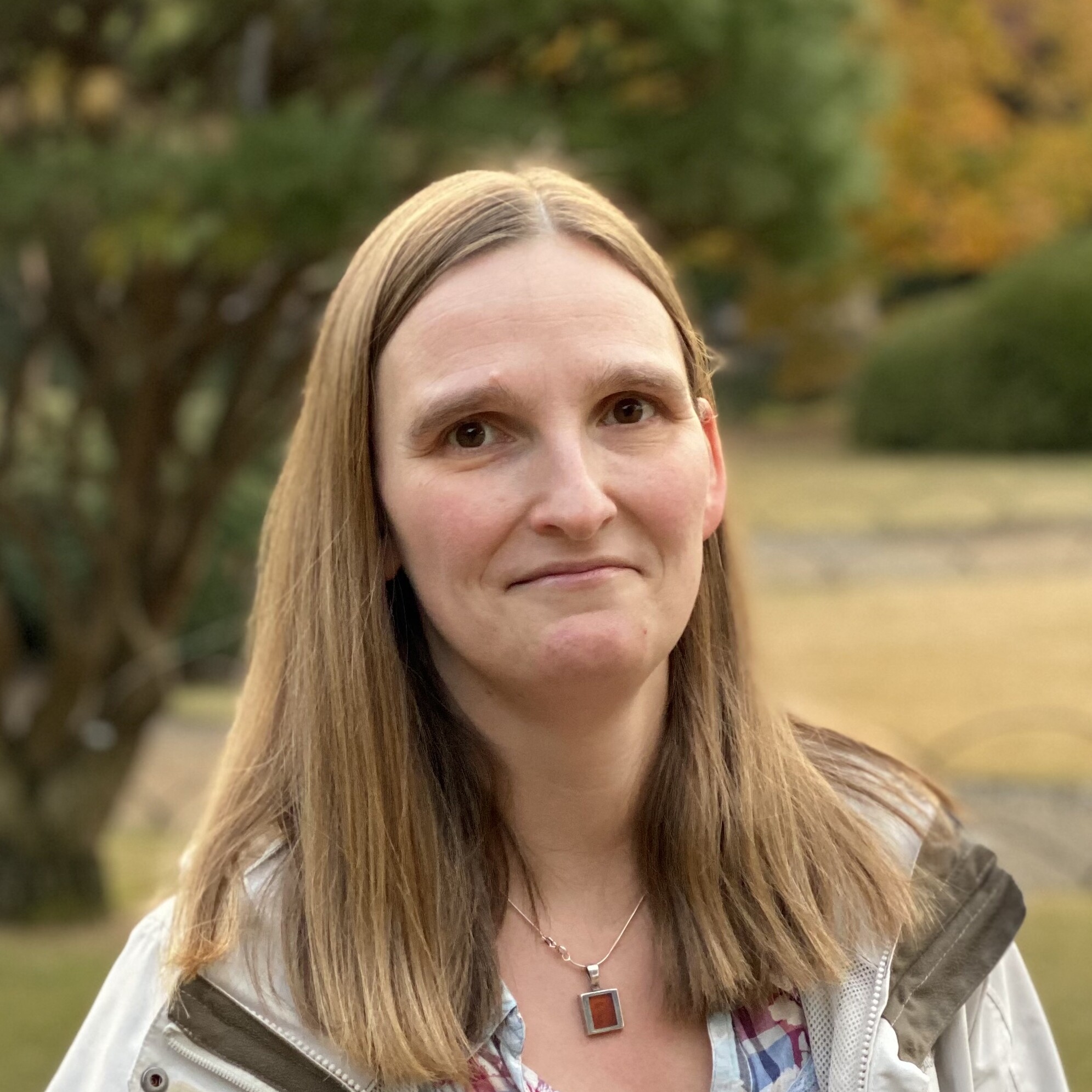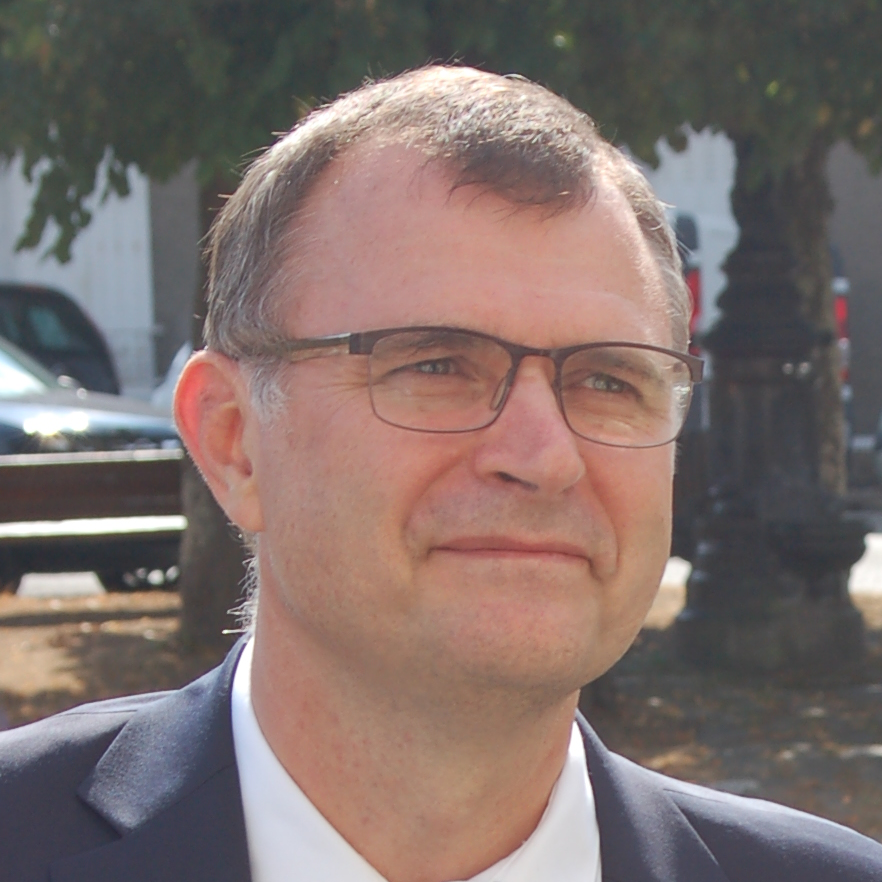NumPEx International collaborations
The InPEx pre-workshop: October 19-20, 2023
The InPEx pre-workshop photogroup
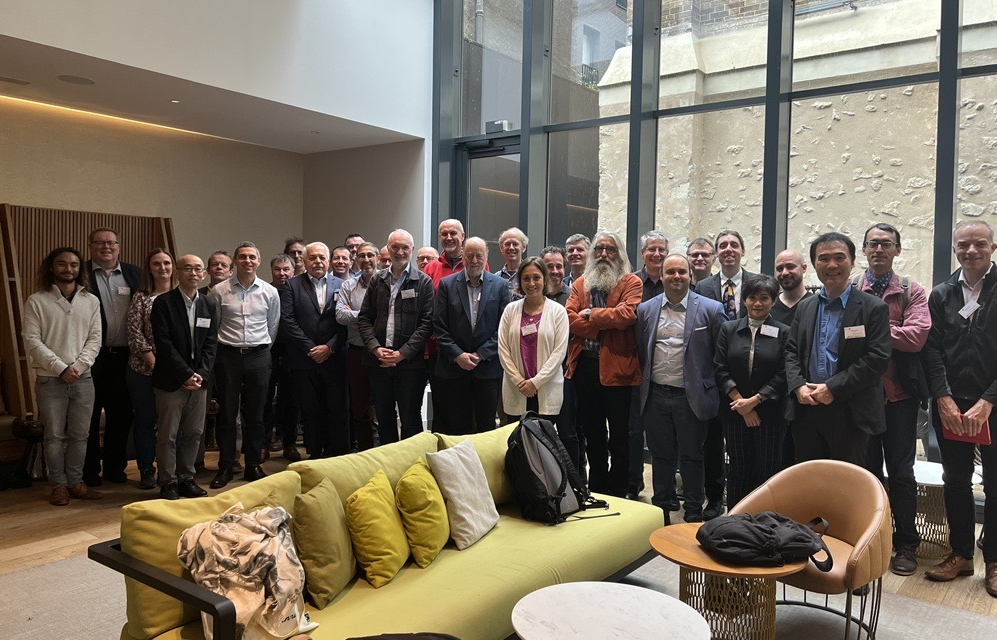
19th October 2023
9:00-10:00 – Welcome & Coffee (on-site)
10:00-12:00 – Introduction and panel presentations
- Context and objectives of the meeting – Pete Beckman (NAISE), Jean-Yves Berthou (Inria)
- Presentations and exchanges on the state of the art for Exascale and post-Exascale projects/programs:
- Japan, 30 min
- Riken CCS Presentation – Satoshi Matsuoka (Riken CCS)
- USA, 30 min
- Science for AI Presentation – Pete Beckman (NAISE),
- DOE-Science Presentation – Ceren Susut-Bennett (DOE-Science)
- DOE-NNSA Post-Exascale Presentation – Thuc Hoang (DOE – NNSA)
- Europe, 30 min
- EuroHPC Presentation – Stéphane Requena (Genci)
- Jupiter Presentation – Bernd Mohr (Jülich Computing Center)
- NumPEx Presentation – Jérôme Bobin (CEA)
- EUPEX Presentation – Gabriel Antoniu (Inria)
- Exascale in UK Presentation – Michèle Weiland (EPCC – University of Edinburgh)
- Japan, 30 min
12:00-13:30 – Lunch (and photo group)
13:30-15:00 – Thematic subgroup discussions (around 90 min. each themes)
Subgroup session 1:
- #1 – Software production and management: packaging, documentation, builds, results, catalogs, continuous integration, containerization, LLVM, parallel tools and sustainability. – Bernd Mohr (Jülich Computing Center), Bruno Raffin (Inria)
- #2 – HPC/AI convergence: ML, LLM for science, open models and datasets for AI training – Pete Beckman (NAISE), Jérôme Bobin (CEA)
- #3 – Energy and environmental impact and sustainability – Michèle Weiland (EPCC – University of Edinburgh), Georges Da Costa (IRIT)
15:00-15:30 – Coffee break
15:30-17:00 – Thematic subgroup discussions (around 90 min each themes)
Subgroup session 2:
- #1 – Future and disruptive SW & HW technologies and usages (including accelerators): roadmaps, adoption… – Jack Dongarra (Univ. Tennessee), Jean-Yves Berthou (Inria)
- #2 – Co-design, benchmarks/mini Apps/Proxy and evaluation (HW & SW & Applications) – Jean-Pierre Vilotte (CNRS), Masaaki Kondo (Riken CCS)
- #3 – Digital Continuum and Data management – Francesc Lordan (BSC), François Bodin (Univ. Rennes)
17:15-22:00 – Social event & Diner
20th October 2023
9:00-11:00 – Feedbacks from thematic subgroups and exchanges – Thematic Subgroups Rapporteurs (20 min. each)
- Software production and management Presentation – Bernd Mohr (Jülich Computing Center), Bruno Raffin (Inria)
- HPC/AI convergence Presentation – Pete Beckman (NAISE), Jérôme Bobin (CEA)
- Energy and environmental impact and sustainability Presentation – Michèle Weiland (EPCC – University of Edinburgh), Georges Da Costa (IRIT)
- Future and disruptive technologies and usages Presentation – Jack Dongarra (Univ. Tennessee), Jean-Yves Berthou (Inria)
- Co-design, benchmarks/mini Apps/Proxy and evaluation Presentation – Jean-Pierre Vilotte (CNRS), Masaaki Kondo (Riken CCS)
- Digital Continuum and Data management Presentation – Francesc Lordan (BSC), François Bodin (Univ. Rennes)
11:00-11:30 – Coffee break
11:30-12:00 – Preparing the Birds of Feather for SC2023: subjects and key aspects
- Preparing the InPEx BoF for SC2023 Presentation – Emmanuel Jeannot (Inria), Jean-Yves Berthou (Inria)
12:00-12:30 – Preparing the InPEx workshop series: expected outcomes, organization, agenda and funding
- Preparing the InPEx workshop series Presentation – Pete Beckman (NAISE), Jean-Yves Berthou (Inria), Satoshi Matsuoka (Riken CSS)
12:30 – Conclusion
InPEx Attendees
Gabriel Antoniu
Dr., Research Director - Inria Rennes
Gabriel Antoniu is a Research Director at Inria, Rennes. His research interests include scalable distributed storage, I/O and in situ visualization, as well as data processing architectures favoring the convergence of HPC, Big Data analytics and AI. He received his Ph.D. degree in Computer Science in 2001 from ENS Lyon and his habilitation for research supervision in 2009 from ENS Cahan/Brittany. He currently serves as Vice Executive Director of JLESC – Joint Inria- Illinois- ANL-BSC-JSC-RIKEN/AICS Laboratory for Extreme-Scale Computing on behalf of Inria. He has served as a PI for international projects in the aforementioned areas in partnership with Microsoft Research, Argonne National Lab, the University of Illinois at Urbana Champaign, Barcelona Supercomputing Cente, IBM, ATOS, Total. He served as a Program Chair for the IEEE Cluster conference in 2014 and 2017 and regularly serves as a PC member of major conferences in the area of HPC, cloud computing and Big Data analytics (SC, HPDC, CCGRID, Cluster, Big Data, etc.). He has acted as an advisor for 20+ PhD theses and has co-authored 150+ international publications in the aforementioned areas.
Sanzio Bassini
Director of the Supercomputing Application and Innovation Department - CINECA
Sanzio Bassini has been responsible of the scientific computing systems installed at CINECA and in 1984 joint the Italian Supercomputer Project that introduced the first supercomputer of this class in Italy. In 1986 he has been convener of the Operating System Committee of the Cray User Group independent conference. In 1992, he has been appointed Team Leader of the CINECA Supercomputing Group. From 1992 to 1996 he has been member of the EC High Performance Computing & Networking EC committee. In 1996, he has been appointed CINECA High Performance System Division Manager. From 2006 to 2010 he was CINECA Director of the System and Technology Department for the Development and Management of CINECA Information System. From 2010, upfront the delegation from Italian Ministry of Education University and Research to CINECA to represent Italy within the PRACE Legal Association for the implementation of the European Supercomputing Research Infrastructure. In his position of Technical Director since 2006 he is a member of the CINECA Consortium Technical Committee. In his career he has been project leader of many European projects funded by the DG INFSO (now Connect) and by the DG Research and participated to many infrastructure projects in the area of information technology, networking and supercomputing. In June 2014 was elected PRACE Council Chairman.
Pete Beckman
Dr., Co-Director - Northwestern University / Argonne Institute for Science and Engineering
Pete Beckman is a Distinguished Fellow at Argonne National Laboratory and the Co-Director of the Northwestern University / Argonne Institute for Science and Engineering. His current research interests include extreme scale operating systems, low-level system software, artificial intelligence at the edge, smart sensing, and distributed sensor networks. He is PI of the Argo project which is building low-level system software for the Extreme Computing Project and he is also the PI for the NSF SAGE project building a national infrastructure for software-defined sensors and artificial intelligence at the edge. Beckman received his Ph.D. in computer science from Indiana University.
Jean-Yves Berthou
Dr., Director - Inria Saclay & NumPEx Co-Director
Dr. Jean Yves Berthou joined Inria in February 2019 as director of the Inria Saclay Research Center. He is the co-Director of the French Exascale program NumPEx. For last 15 years, Jean-Yves was regularly called upon by the European Commission for expert missions, particularly in the fields of High Performance Computing, open science or research and innovation strategy. He was part of the European Commission's high-level expert group on the European Open Science Cloud in 2016. He initiated in 2010 EESI's European support action, the European Exascale Software Initiative, www.eesi-project.eu.
Jérôme Bobin
Research director CEA at the Institute for Research on the fundamental laws of the universe (CEA Irfu),
and NumPEx co-director
Jérôme Bobin received his Ph.D. from Paris-Sud University (now Paris-Saclay University) (France) in 2008 in Computer Science. From 2008 to 2010, he has been a postdoctorate fellow in the applied mathematics department at the California Institute of Technology, and then in the mathematics department at Stanford University. From 2010, he is a researcher at CEA/IRFU. From 2010 to 2021, he has been member of the CosmoStat laboratory, and co-lead of the laboratory from 2014 to 2021. Since 2021, he is research director in the LILAS (Laboratoire d’Ingénierie Logicielle pour les Applications Scientifiques) at IRFU. From 2016 to 2021, he has been the principal investigator of the LENA project, funded by the ERC (Starting Grant programme), devoted to the development of machine learning solutions in the scope of signal processing, with applications in Astrophysics. In 2021, he received, with his collaborators, the « Prix de la Recherche LNE » for his work on data analysis applied to nuclear physics. Since 2022, he is co-director of the NumPEx, a 6-years, 40 MEuros project focusing on high performance numerics for the Exascale. His research interests are in signal and image processing, machine learning, statistics, massive data analysis, and their applications in physics, with a special emphasis on astrophysic and nuclear physics. From 2006 to 2015, he has been member of the ESA/Planck consortium, where he actively participated to the analysis and exploitation of the Planck data. He is member of the ESA/LISA consortium and he participates actively to the ESA/Athena space mission.
François Bodin
Dr., Professor - Rennes I University
François Bodin held various research positions at University of Rennes I. His contribution includes new approaches for exploiting high performance processors in scientific computing and in embedded applications. He cofounded CAPS Company in 2002 while he was a Professor at University of Rennes I and in January 2008 he becomes the company CTO. In 2013 he is back at Irisa (https://www.irisa.fr) on a professor position. He is currently involved in data related projects such as the PEPR Numpex (https://numpex.fr/) and RUDI (https://rudi.bzh/catalogue).
Alfredo Buttari
Dr., Research Director - CNRS / IRIT Toulouse
Alfredo Buttari, is currently CNRS Research Director at the IRIT laboratory of Toulouse where he previously held a Researcher position from 2008 to 2021. He is a member of the APO (Algorithmes Parallèles et Optimisation) team. In 2006 he received the PhD degree in computer science of the University of Rome Tor Vergata; successively, in 2006-2007 he held a post-doctoral position at the Innovative Computing Laboratory of the University of Tennessee Knoxville under the direction of Jack Dongarra and, in 2008 a post-doctoral position at the LIP laboratory, ENS-Lyon. He is an expert of high performance, parallel computing, mathematical software and parallel algorithms for dense and sparse linear algebra. His most significant scientific contributions are represented by scalable, tiled linear algebra algorithms for multicore architectures, mixed-precision dense and sparse linear algebra algorithms and the use block low-rank format and related algorithms in dense and sparse solvers. He contributed to the integration of these algorithms in widely used software packages such as MUMPS, PSBLAS or qr_mumps. He is co-author of roughly 50 papers on these subjects in international journals and conference proceedings. Alfredo Buttari has participated in the national ANR SOLHAR (2013-1028) project and he is the principal investigator of the ANR SOLHARIS (2019-2024) project. He has participated in the European EoCoE-II project. He is co-PI of the Exa-SofT project in the NumPEx PEPR program. Since 2019 he is the head of the CISO (Calcul Intensif Simulation et Optimisation) departement of the IRIT laboratory.
Daniele Cesarini
Dr., Project Manager & HPC Technology Specialist, CINECA
Dr. Cesarini is a Project Manager & HPC Technology Specialist at the HPC department of CINECA where his works is focused on the design of the next-generation HPC architectures to define the strategic roadmap of Italian and European supercomputers. He is Vice-chair for Research of ETP4HP and he is part of the scientific advisory board of EuroHPC JU (RIAG). He manages for CINECA several European founded projects (EPI-SGA1, EPI-SGA2, EUPEX, REGALE, etc.) and national projects of the Italian Recovery and Resilience Plan (PNRR). He graduated in Computer Engineering from the University of Bologna (Italy) in 2014, where he also earned his Ph.D. in Electronics, Telecommunications, and Information Technologies Engineering in 2019.
Georges Da Costa
Dr., Professor in Computer Science - IRIT Toulouse
Georges Da Costa is Professor in Computer Science at the University of Toulouse. He received its PhD from LIG (Grenoble, France) in 2005 and his Habilitation from University Paul Sabatier (Toulouse, France) in 2015. He is a member of the IRIT Laboratory. His research currently focus on energy aware distributed systems. His research highlights are HPC & cloud computing, large scale energy aware distributed systems, performance evaluation, ambient systems.
Jack Dongarra
Dr., Emeritus Professor - University of Tennessee
Jack Dongarra specializes in numerical algorithms in linear algebra, parallel computing, the use of advanced computer architectures, programming methodology, and tools for parallel computers. He holds appointments at the University of Manchester, Oak Ridge National Laboratory, and the University of Tennessee, where he founded the Innovative Computing Laboratory. In 2019 he received the ACM/SIAM Computational Science and Engineering Prize. In 2020 he received the IEEE-CS Computer Pioneer Award. He is a Fellow of the AAAS, ACM, IEEE, and SIAM; a foreign member of the British Royal Society and a member of the U.S. National Academy of Science and the National Academy of Engineering. Most recently, he received the 2021 ACM A.M. Turing Award for his pioneering contributions to numerical algorithms and software that have driven decades of extraordinary progress in computing performance and applications.
Norbert Eicker
Dr., Head of the research group Cluster Computing - Jülich Supercomputing Centre
Norbert Eicker is Professor for Parallel Hard- and Software Systems at Bergische Universität Wuppertal and head of the research group Cluster Computing at Jülich Supercomputing Centre. Before joining JSC in 2004 Norbert was with ParTec working on the Cluster Middleware ParaStation. During his career he was involved in several research and development projects of large scale Cluster systems in Wuppertal and Jülich. During the last years he acted as the lead architect for the DEEP series of project helping to develop the Cluster-Booster concept and the Modular Supercomputing Architecture and is now working on DEEP-SEA. Norbert holds a PhD in Theoretical Particle Physics from Wuppertal University.
Hal Finkel
Dr., Program Manager - Advanced Scientific Computing Research program, US Department of Energy Office of Science
Hal Finkel is a program manager for computer-science research in the US Department of Energy Office of Science’s Advanced Scientific Computing Research (ASCR) program. Prior to joining ASCR, Hal was the Lead for Compiler Technology and Programming Languages at Argonne’s Leadership Computing Facility. As part of DOE’s Exascale Computing Project (ECP), Hal was a PathForward technical lead and PI/Co-PI of several multi-institution activities. Hal also helped develop the Hardware/Hybrid Accelerated Cosmology Code (HACC), a two-time IEEE/ACM Gordon Bell Prize finalist. He graduated from Yale University in 2011 with a Ph.D. in theoretical physics focusing on numerical simulation of early-universe cosmology.
Francesc Lordan
Dr., Recognized Researcher - BSC
Francesc Lordan is a researcher at the Barcelona Supercomputing Center (BSC-CNS). Francesc obtained his PhD in Computer Architecture from the Universitat Politècnica de Catalunya (UPC) in 2018 winning the Special Doctorate Award. Since 2010, Dr. Lordan has been part of the Workflows and Distributed Computing group of the Barcelona Supercomputing Center contributing to the development of the COMPSs programming model: a task-based model for parallel applications targeting heterogeneous distributed infrastructures. During these years, Francesc has contributed to more than 20 R&D projects with competitive funding and has published more than 30 peer-reviewed papers. Currently, his research focuses on programming models that ease the development of parallel applications across the digital Continuum.
Sergi Girona
Dr., Director of the Operations Department - BSC
Sergi Girona holds a PhD in Computer Science from the Universitat Politècnica de Cataluya – Barcelona Tech. Currently he is director of the Operations Department at Barcelona Supercomputing Center (BSC) and the manager of the Spanish Supercomputing Network (RES). Between 2013 and 2015, he was both chair of the Board of Directors of PRACE and its managing director. He joined BSC in 2004 for the installation of MareNostrum in Barcelona, which was at that time the largest supercomputer in Europe, a position that maintained for 3 years. Dr Girona was responsible for site preparation and coordination with IBM for the system installation. Today, his responsibilities include managing the operations group, which is responsible for providing user support and system administration of the various HPC systems at BSC. BSC has installed 4 MareNostrums' and, number 5 will come in production in 2023.
Simon Hammond
Dr., Program Manager - US National Nuclear Security Administration
Simon Hammond is a Federal program manager at the US National Nuclear Security Administration (NNSA). He has a Ph.D in High Performance Computing and Performance Analysis from the University of Warwick. His field of expertise encompases subjects such as Performance Prediction using Simulation, Advanced GPU Acceleration, Mathematical Libraries, etc.
Thuc Hoang
Director of the Office of Advanced Simulation and Computing and Institutional Research and Development Programs - US Department of Energy, National Nuclear Security Administration
Thuc Hoang is the Director of the Office of Advanced Simulation and Computing (ASC) and Institutional Research and Development Programs in the Office of Defense Programs, within the Department of Energy National Nuclear Security Administration (NNSA). The ASC program develops and deploys high-performance simulation capabilities and computational resources to support the NNSA annual stockpile assessment and certification process, and other nuclear security missions. Ms. Hoang currently manages the NNSA Exascale Computing Initiative and other interagency collaboration projects. She has served on proposal review panels and advisory committees for the National Science Foundation, Department of Defense and DOE Office of Science, as well as for some other international HPC programs. Ms. Hoang holds a Bachelor of Science in Electrical Engineering from Virginia Tech and a Master of Science in Electrical Engineering from Johns Hopkins University.
Janne Ignatius
Dr., Program Director - CSC – IT Center for Science
Dr. Janne Ignatius is Program Director responsible for Post-Exascale Technology Program at CSC – IT Center for Science, Finland. He holds an Adjunct Professorship in Theoretical Physics at University of Helsinki. Dr. Ignatius has been involved in key roles in the procurements of supercomputers in Finland. He has supervised CSC’s computing services and been active in R&D in high-performance computing. Dr. Ignatius has served in several confidential posts in the area of HPC, for instance as Chair and Vice-Chair of the Council of PRACE, Partnership for Advanced Computing in Europe.
Emmanuel Jeannot
Dr., Senior Research Scientist - Inria
Emmanuel Jeannot is a senior research scientist at Inria Bordeaux. He got his PhD degree in computer science from the Ecole Normale Suprieure de Lyon (France) in 1999. From 2000 to 2005, he was assistant professor at the University Henry Poincaré in Nancy. From 2005 to 2009, he worked for the Nancy Grand-Est Inria research center. Additionally, in 2006 he was a visiting researcher at the University of Tennessee, ICL laboratory. Since 2009, Emmanuel Jeannot is conducting his research at INRIA Bordeaux Sud-Ouest (where he is leading the TADaaM team) and at the LaBRI laboratory of the University of Bordeaux. His main research interests span the vast domain of parallel and high-performance computing and more precisely: runtime systems, processes placement, topology-aware algorithms, scheduling for heterogeneous environments, data redistribution, I/O and storage, algorithms and models for parallel machines, adaptive online compression and programming models.
Maasaki Kondo
Dr., Team leader of Next Generation High Performance Architecture Research Team - RIKEN Center for Computational Science
Masaaki Kondo received the BS degree in information engineering, in 1998, the MS degree in engineering from the University of Tsukuba, in 2000, and the Ph.D. degree from The University of Tokyo, in 2003. He is currently a professor of information and computer science at Keio University. He is also working at the RIKEN Center for Computational Science as the team leader of Next Generation High Performance Architecture Research Team. At RIKEN, he is leading Feasibility Studies project on Next-Generation Supercomputing Infrastructures by the Ministry of Education, Culture, Sports, Science and Technology, Japan. Currently, his research interests include computer architecture, high performance computing, VLSI designs, artificial intelligence, and quantum computer.
Kimmo Koski
Dr., CEO - CSC
Dr. Kimmo Koski is the CEO of CSC. He started working at CSC in August 2004 with a mission to support Finnish research providing world-class e-infrastructure and related services. This include investments in national resources and active participation in European initiatives. The most recent example is the eco-efficient datacenter hosting the LUMI EuroHPC pre-exascale system, which is currently #3 in TOP500 list. Koski has been involved in various European and global collaborations in high-performance computing, data management, networks and cloud activities. Examples include EU initiatives, such as EuroHPC, EUDAT, EOSC and PRACE. Increasing focus is also in artificial intelligence and quantum computing. Targets for the near future include building more intense HPC and data driven collaboration with global partners such as supercomputer centers and national laboratories.
Michaël Krajecki
Dr., Deputy Scientific Director of the Institute for Information Sciences - CNRS & NumPEx Co-Director
Michaël Krajecki is Deputy Scientific Director of the Institute for Information Sciences at CNRS and Professor at the University of Reims Champagne-Ardenne. Since 2023, he is co-director of the NumPEx, a 6-years, 40 MEuros project focusing on high performance numerics for the Exascale. In 1998, he defended his PhD in computer science from the University of Metz. In 2017, he was an auditor of the 54th national session « Armaments and Defence Economy » of the Institute for Higher National Defence Studies (Master of executive Programme Economy and Defence from IHEDN). From 2019 to 2023, Pr. Michaël Krajecki was the director of the Artificial Intelligence Project of the French Ministry of Defence. As the ministerial AI coordinator, he was the ministry's representative for defence AI matters and organises the overall action via the Defence Artificial Intelligence Coordination Unit, created and housed within the Defence Innovation Agency. As an expert in numerical simulation and AI, he was responsible for the ROMEO regional computing center and the CReSTIC research laboratory. His commitment also led him to be elected vice-president in charge of digital strategy at the University of Reims Champagne-Ardenne from 2007 to 2012. He has also directed many doctoral theses focused on high-performance computing and AI.
Nicolas Lardjane
Dr., Head of TGCC-CCRT - CEA-TGCC Supercomputing Center
After a PhD in computational fluid dynamics in 2002, Dr. Nicolas Lardjane worked as a computational scientist in an INRIA startup. He joined CEA in 2004 as a researcher in computational physics, working on turbulence modeling, shock physics, numerical methods and the development of HPC codes. He then led a research group dedicated to geophysical hazards and promoted the development of HPC in this area. Since 2003, N. Lardjane is Head of CEA/TGCC Supercomputing Centre. The TGCC is one of the largest computing facility in France and will host EuroHPC 2nd exascale supercomputer by the end of 2025.
Satoshi Matsuoka
Dr., Director - RIKEN Center for Computational Science
Satoshi Matsuoka has been the director of RIKEN Center for Computational Science (R-CCS) since 2018. He is responsible for developing the supercomputer Fugaku which has become the fastest supercomputer in the world in all four major supercomputer rankings in 2020 and 2021 (Top500, HPCG, HPL-AI, Graph500), along with multitudes of ongoing cutting edge HPC research being conducted, including investigating Post-Moore era computing, especially the future Fugaku NEXT supercomputer. He was the leader of the TSUBAME series of supercomputers that had also received many international acclaims, at the Tokyo Institute of Technology, where he still holds a professor position, to continue his research activities in HPC as well as scalable Big Data and AI. His longtime contribution for the computer science research was commended with the Medal of Honor with Purple ribbon by his Majesty Emperor of Japan in 2022.
Bernd Mohr - Division Head "Application Support", Forschungszentrum Jülich
Dr.-Ing., Division Head "Application Support" - Jülich Supercomputing Center
Bernd Mohr has been a senior scientist at Forschungszentrum Juelich since 1996. Since 2000, he has been the team leader of the group ''Programming Environments and Performance Analysis''. Since October 2022, he also serves as head for the JSC division ''Application support'', for which he was deputy head for 15 years. He was an active member in the International Exascale Software Project (IESP/BDEC) and work package leader in the European (EESI2) and Juelich (EIC, ECL) Exascale efforts.
Christophe Prud'homme
Dr., Professor - UNISTRA
Christophe Prud’homme is a Professor in Applied Mathematics at the University of Strasbourg, with a Ph.D. on non-conforming domain decomposition from University Pierre and Marie Curie, followed by experiences at MIT and EPFL. He notably contributed to the development of the reduced basis methods at MIT and applications Health projects and the Solar Impulse airplane at EPFL. Since 2013, he is leading Cemosis, Strasbourg’s platform in mathematics for innovation where mathematics meets real-world challenges. A seasoned expert in Modeling, Simulation, and Optimization, his forte lies in the intricate world of partial differential equations, finessed through methods like Finite Element, domain decomposition, and reduced order methods. He passionately advocated for Open Science and Software, exemplified by his work on Feel++. Initiated in 2006, this framework aids in resolving complex PDEs from laptops to supercomputers and has become integral to Cemosis’ projects.
Bruno Raffin
Inria research director at Inria Grenoble, member of the DataMove join research team (Inria, LIG - CNRS/Inria/Université Grenoble Alpes) and WP3 Co-leader
Bruno Raffin is Research Director at INRIA, France, and leader of the DataMove team. He led the development of the FlowVR and Melissa middlewares for large-scale data-flow oriented parallel applications for scientific visualization, computational steering, in situ data analytics, ensemble-based sensibility analysis, data assimilation, deep surrogate training. He also worked on parallel algorithms and cache-efficient parallel data structures (cache oblivious mesh layouts, parallel adaptive sorting), strategies for task-based programming on multi-CPU and multi-GPU machines. Bruno Raffin accounts for more than 60 international publications, 17 advised PhD students. Bruno Raffin has been involved in more than 40 program committees of international conferences. He was responsible for INRIA of more than 15 national and European grants and was the co-founder of the Icatis start-up company. He lead the INRIA Challenge on the convergence between HPC, AI and Big Data (2018-2022).
Stéphane Requena
Director of Technology and Innovation - GENCI
Stéphane Requena is Director of Technology and Innovation at GENCI (France). Previously he has been during 10 years in charge of the HPC facilities at Institut Français du Pétrole and involved into optimisation and parallelisation of oil & gas (geology, seismic, reservoir modeling) and automotive applications. He also worked at CS a French service company in parallelising applications in the field of energy for EDF and CEA. At GENCI he has been involved in several European projects including PRACE aisbl (as memnber of the Board of Directors), PRACE implementation projects (Prace-xIP), PPI4HPC (Public Procurement of HPC Innovative Solutions), Mont-Blanc (toward ARM based architectures used for HPC), EPI and EUPEX (toward designing European Processor technologies), EESI (European Exascale Software Initiative) and EXDCI (European eXtreme Data and Computing Initiative) in relation to the scientific and industrial applications roadmaps. He is also currently involved into EuroHPC as member of INFRAG and into Jules Verne consortium for the 2nd EuroHPC Exascale system. At GENCI he is also in charge of the development of innovative services toward the use of AI, quantum computing, use of urgent computing for decision making, link with scientific instruments and the technical part of GENCI’s procurements for HPC and storage facilities.
Ceren Susut-Bennett
Dr., Associate Director of Science - Advanced Scientific Computing Research program, US Department of Energy Office of Science
Ceren Susut-Bennett has served in ASCR for more than 12 years as a program manager, the director for ASCR’s Computational Science Research and Partnerships Division, and most recently as the acting associate director for ASCR. Dr. Susut was instrumental to the establishment of the National Quantum Information Science Research Centers, established a platform for American industry and national laboratory scientists to speak directly with Congressional staffers, and organized a series of panel discussions that showcased the productivity of public-private collaborations to accelerate emergent technologies and American leaderships. Among Dr. Susut’s other achievements are her efforts to plan, budget, and launch cycles of the Scientific Discovery through Advanced Computing (SciDAC) program and boosting SciDAC’s collaboration and outreach approach to DOE communities outside the Office of Science. Dr. Susut has demonstrated outstanding leadership in championing the new and rapidly emerging opportunities and challenges presented by Artificial Intelligence (AI).
Jean-Pierre Vilotte
CNRS Research director, Scientific Deputy at CNRS Earth & Space and Co-PI & WP1 Co-leader
Dr. Jean-Pierre Vilotte (orcid.org/0000-0002-6085-6498), PhD, HDR, is Professor at the Institut de Physique du Globe de Paris (IPGP, CNRS-UMR 7154), and was until 2020 Director of the High-performance Computer and Data Analysis Centre of IPGP. He is Scientific Deputy at the CNRS-INSU for High-Performance Computing & Data Analysis, AI/ML, Fair Data and Open Science. He is the French representative at the SKA Regional Centres Steering Committee (SRC), where is is acting as Vice-Chair. In 2015, he was awarded Fellow of the American Geophysical Union. He is actively involved in the French PEPR program (CNRS-CEA,INRIA) Numerics for Exascale (NumPEx) in which he is scientific coordinator of the Exa-DI project focussing on co-design, co-development and integration of expanded application-driven Exascale software stack. He has an international expertise in mathematical and computational geophysics, at the interface between mathematics, statistical physics, computational and data sciences. He has been nominated Fellow of the American Geophysical Union in 2015.
Michèle Weiland
Dr., Director of Research and Met Office Joint Chair - Edinburgh Parallel Computing Centre
Professor Michèle Weiland is the Director of Research and Met Office Joint Chair at EPCC, the supercomputing at the University of Edinburgh. She specialises in novel technologies for extreme scale parallel computing, leading EPCC’s technical work in the UKRI funded ASiMoV Strategic Prosperity Partnership with Rolls-Royce, which is developing high-fidelity multi-physics simulations of aircraft engines. She also leads the University of Edinburgh’s involvement in the Met Office Academic Partnership and collaborates with the Met Office on developing their next generation weather modelling systems. She is a PI on the AI for Net Zero project “Real-time Digital Optimisation and Decision Making for Energy and Transport Systems” and is a regular contributor to the UK’s Net Zero Digital Research Infrastructure project. She is a member of the EPSRC e-Infrastructure Strategic Advisory Team.

